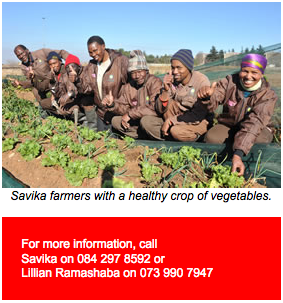When a group of unemployed people on the East Rand joined hands to start an organic farming business to support their families, its success exceeded their expectations.
 Three years after a group of unemployed people from Kwa-Thema planted the seeds for the Savika Agricultural Primary, this unique venture is sprouting all over the East Rand.
Three years after a group of unemployed people from Kwa-Thema planted the seeds for the Savika Agricultural Primary, this unique venture is sprouting all over the East Rand.
Today, they use three hectares of land donated by the Ekurhuleni East College to farm organic vegetables. This not only helps them to put food on the table for their families, but to supply other markets and local shops.
Cooperative
In 2009, the Savika Agricultural Primary registered as a cooperative and today the business is run by seven committed members.
From small beginnings, they now produce enough to supply organic vegetables to the fresh produce market in Springs, as well as to a mini butchery in Springs and Pick 'n Pay in Duduza.
Developing skills
The Savika team did not achieve success overnight. They worked very hard to get the business going, but realised that they needed to improve their farming skills. To this end, they received three months’ training and guidance on effective farming methods from the Afrisun East Rand Community Trust (AERCT) from January last year.
Training included the correct way to dig trenches and to test and fertilise soil before planting. In addition to the training, they also received tools.
In November last year, three Savika members, Lillian Ramashaba, David Mavimbela and Columbus Zitha, received further training. Sponsored by the Gauteng Department of Health, they attended a training course in agriculture at the Tshwane University of Technology, which they completed successfully.
Employing more people
Savika’s mission is to be a sustainable producer of organic vegetables. They also aim to create jobs by employing more people from their community and to teach people about the importance of organic farming.
Lillian Ramashaba said she hoped that in the near future more people in the community could have land to run their own farming businesses. She emphasised the importance of teaching youngsters in rural communities about organic farming, encouraging them to become entrepreneurs and making things happen for themselves.



 Facebook
Facebook Twitter
Twitter WhatsApp
WhatsApp